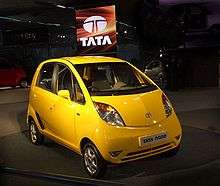Tata Group
 | |
| Private | |
| Industry | Conglomerate |
| Founded | 1868 |
| Founder | Jamsetji Tata |
| Headquarters |
Bombay House, Mumbai, Maharashtra, India |
Area served | Worldwide |
Key people |
Ratan Tata (Interim Chairman) |
| Products |
|
| Revenue |
|
| Total assets |
|
| Owner | Tata Sons |
Number of employees | 660,800 (2016)[1] |
| Subsidiaries | List of subsidiaries |
| Website |
www |
Tata Group is a multinational conglomerate and holding company headquartered in Mumbai, Maharashtra, India. It was founded in 1867 by Jamsetji Tata and gained international recognition after purchasing several global companies. It is India's largest conglomerate. In 2015-16, the revenue of Tata companies, taken together, is $103.51 billion.[2] These companies collectively employ over 660,000 people.[2] Each Tata company or enterprise operates independently under the guidance and supervision of its own board of directors and shareholders. There are 30 publicly-listed Tata enterprises with a combined market capitalisation of about $116 billion as of March 2016.[3] Tata companies with significant scale include Tata Steel, Tata Motors, Tata Consultancy Services, Tata Power, Tata Chemicals, Tata Global Beverages, Tata Teleservices, Titan, Tata Communications and Taj Group.
Chairmen
- Jamsetji Nusserwanji Tata (1867–1904)
- Sir Dorab Tata (1904–1932)
- Nowroji Saklatwala (1932–1938)
- Jehangir Ratanji Dadabhoy Tata (1938–1991)
- Ratan Tata (1991–2012)
- Cyrus Pallonji Mistry (2012–2016)
- Ratan Tata (October 2016–present; Interim)
Subsidiaries

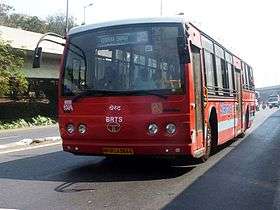
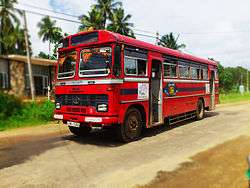
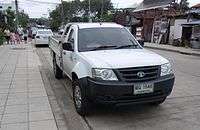
This section lists the Tata companies and details their business:
Chemicals
- Rallis India
- Tata Pigments Limited
- General Chemical Industrial Products
- Brunner Mond
- Advinus Therapeutics
- Magadi Soda Company
Consumer products
- Tata Salt
- I-shakti
- Casa Décor
- Tata Swach
- Tata Global Beverages, is the world's second largest manufacturer of packaged tea and tea products.
- Tata Starbucks, is a 50:50 joint venture company, owned by Starbucks Corporation and Tata Global Beverages
- Eight O'Clock Coffee
- Tetley
- Tata Coffee
- Himalayan, mineral water brand
- Tata Ceramics
- Infiniti Retail (Cromā)
- Tata Industries
- Titan Industries
- Trent (Westside)
- Tata CLiQ
- Landmark Bookstores
- Tata Sky
- Voltas, consumer electronics company
- Tata International Ltd.
- Tanishq
- Tata Zoya
- Fastrack, Youth Fashion Brand
- Titan Eye+, Optical Stores from Titan Industries
- Tata Refractories
- Westside
Energy
- Tata Power is one of the largest private sector power companies.
- Tata Power Solar, started as a joint venture between Tata Power and BP Solar, now a wholly owned company.
- Hooghly Met Coke and Power Company
- Jamshedpur Utilities and Services Company
- Tata Power Delhi Distribution Ltd (Formerly Known as North Delhi Power Ltd)
- Powerlinks Transmission
- Tata Power Trading
- Tata Projects
- Tata Petrodyne
Engineering
- TAL Manufacturing Solutions
- TASL (Tata Advanced Systems Limited)
- Tata AutoComp Systems Limited (TACO)
- Hispano Carrocera
- Tata Motors, manufacturer of commercial vehicles (largest in India) and passenger cars
- Jaguar Land Rover (Manager of Tata's English brands Jaguar cars and Land Rover)
- Tata Daewoo Commercial Vehicle
- Tata Projects
- Tata Technologies Limited
- Tata Marcopolo
- Tata Consulting Engineers Limited
- Tata Cummins
- Telco Construction Equipment
- TRF
- Voltas Global Engineering Centre
- Tata Advanced Materials
- Tata Advanced Systems
- Tata Motors European Technical Centre
- Tata Petrodyne
- Tata Precision Industries
- Telcon Construction Equipment
Information systems and communications
- Computational Research Laboratories
- INCAT
- Nelco
- Nelito Systems
- Tata Business Support Services
- Tata Consultancy Services Ltd. (TCS) is one of the world's largest IT Services companies.
- Tata Elxsi
- Neotel
- Tata Interactive Systems
- Tata Teleservices
- Tata DoCoMo
- Tata Communications
- CMC Limited
- VSNL International Canada
- Tatanet, Managed connectivity and VSAT service provider
Services
- Tata Sons
- TajAir
- Mjunction
- Vistara
- Air Asia India joint venture with Air Asia
- The Indian Hotels Company
- Taj Hotels
- Vivanta By Taj
- The Gateway Hotels & Resorts
- Ginger Hotels
- Roots Corporation
- Tata Housing Development Company Ltd. (THDC)
- Tata Limited
- TATA AIG General Insurance
- TATA AIA Life Insurance
- e-Nxt Financials ltd.
- TKM Global, Logistics and Supply Chain
- Tata AG
- Tata Asset Management
- Tata Financial Services
- Tata Capital Financial Services Limited
- Tata International AG
- Tata Investment Corporation
- Tata Advanced Systems Limited
- Drive India Enterprise Solutions
- Tata Quality Management Services
- Tata Realty and Infrastructure Limited
- Tata Interactive Systems
- Tata Africa Holdings
- Tata AutoComp Systems
- Tata Industrial Services
- Tata NYK
- Tata Services
- Tata Strategic Management Group
Steel
- Tata Steel
- Tata Steel Europe
- Tata Steel KZN
- Tata Steel Processing and Distribution
- JAMIPOL
- NatSteel Holdings
- Tata BlueScope Steel
- Tata Metaliks
- Tata Sponge Iron
- Tayo Rolls
- The Tinplate Company of India
- Tata Bearings
- TM International Logistics
Acquisitions
- February 2000 – Tetley Tea Company, $407 million[4]
- March 2004 – Daewoo Commercial Vehicle Company, $102 million
- August 2004 – NatSteel's Steel business, $292 million
- November 2004 – Tyco Global Network, $130 million
- July 2005 – Teleglobe International Holdings, $239 million
- October 2005 – Good Earth Corporation
- December 2005 – Millennium Steel, Thailand, $165 million
- December 2005 – Brunner Mond Chemicals, $10 million
- June 2006 – Eight O'Clock Coffee, $220 million
- November 2006 – Ritz Carlton Boston, $170 million
- January 2007 – Corus Group, $12 billion[5]
- March 2007 – PT Kaltim Prima Coal (KPC) (Bumi Resources), $1.1 billion
- April 2007 – Campton Place Hotel, San Francisco, $60 million
- January 2008 – Imacid Chemical Company, Morocco[6]
- February 2008 – General Chemical Industrial Products, $1 billion
- March 2008 – Jaguar Cars and Land Rover, $2.3 billion
- March 2008 – Serviplem SA, Spain
- April 2008 – Comoplesa Lebrero SA, Spain
- May 2008 – Piaggio Aero Industries S.p.A., Italy
- June 2008 – China Enterprise Communications, China
- June 2008 – Neotel, South Africa
- October 2008 – Miljo Grenland / Innovasjon, Norway
- April 2010 - Hewitt Robins International, United Kingdom
- July 2013 - Alti SA, France
- December 2014 - Energy Products Limited, India
- June 2016 - Welspun Renewables Energy, India
Philanthropy
The Tata Group has helped establish and finance numerous research, educational and cultural institutes in India.[7][8] The Tata Group was awarded the Carnegie Medal of Philanthropy in 2007 for philanthropic activities.[9] Some of the institutes established by the Tata Group are:
- Tata Institute of Social Sciences
- National Centre for Performing Arts
- Tata Management Training Centre
- Tata Memorial Hospital
- Tata Centre for Technology & Design at IIT Bombay
- Tata Center for Technology & Design at Massachusetts Institute of Technology
- Tata Football Academy
- Tata Cricket Academy
- Tata Trusts, a group of philanthropic organisations run by the head of the business conglomerate Tata Sons[10]
- The JRD Tata Ecotechnology Centre
- The Energy and Resources Institute (earlier known as Tata Energy and Research Institute) – a non-governmental research institute.
- Tata Medical Center, was inaugurated on 16 May 2011, by Ratan Tata[11]
- Tata Cancer Hospital
The Tata Group has donated ₹ 2.20 billion ($50 million) to the Harvard Business School (HBS) to build an academic and a residential building on the institute's campus in Boston, Massachusetts. The new building will be called the Tata Hall and used for the institute's executive education programmes.[12] The amount is the largest from an international donor to Harvard Business School
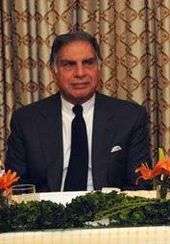
One Tata project brought together Tata Group companies (TCS, Titan Industries and Tata Chemicals) was developing a compact, in-home water-purification device. It was called Tata swach which means "clean" in Hindi and would cost less than 1000 rupees (US$21). The idea of Tata swach was thought of from the 2004 tsunami in the Indian Ocean, which left thousands of people without clean drinking water. This device has filters that last about a year long for a family of five. It is a low-cost product available for people who have no access to safe drinking water in their homes.[14] The advantage of this device is that it does not require the use of electricity.[15]
TCS also designed and donated an innovative software package that supposedly teaches illiterate adults how to read in 40 hours. "The children of the people who have been through our literacy program are all in school", says Pankaj Baliga, global head of corporate social responsibility for TCS.[14]
In 1912, Tata Group expanded their CEO's concept of community philanthropy to be included in the workplace. They instituted an eight-hour workday, before nearly any other company in the world. In 1917, they recommended a medical-services policy for Tata employees. The company would be among the first worldwide to organise modern pension systems, workers' compensation, maternity benefits, and profit-sharing plans.[14]
The charitable trusts of Tata Group fund a variety of projects, for example the Tata Swach and the TCS project. They founded and still support such cherished institutions as the Indian Institute of Science, Tata Institute of Fundamental Research, the National Centre for the Performing Arts and the Tata Memorial Hospital. Each Tata Group company channels more than 4 percent of its operating income to the trusts and every generation of Tata family members has left a larger portion of its profit to them.[14]
After the Mumbai attacks, salaries of the attacked Taj Hotel employees were paid despite the hotel being closed for reconstruction. About 1600 employees were provided food, water, sanitation and first aid through employee outreach centres. Ratan Tata personally visited families of all the employees that were affected. The employee's relatives were flown to Mumbai from outside areas and were all accommodated for 3 weeks. Tata also covered compensation for railway employees, police staff, and pedestrians. The market vendors and shop owners were given care and assistance after the attacks. A psychiatric institution was established with the Tata Group of Social Science to counsel those who were affected from the attacks and needed help. Tata also granted the education of 46 children of the victims of the terrorist attacks.[16][17]
In 2013, the Tata group, through the Tata Relief Committee and the Himmotthan Society, an associate organisation of the Sir Ratan Tata Trust, has been working in close collaboration with the Uttarakhand government to provide relief to the impacted local communities in three districts of the state. The relief activities, which include provision of food and household material, have so far covered over 65 villages and 3,000 families. In the first phase of relief, the group expects to reach over 100 villages. The Tata group also plans to implement long-term measures for the economic, ecological and resource sustainability of the affected communities and areas. The plan, currently under development, will be based on a baseline survey of impacted villages which is being carried out by teams from the Centre for Disaster Management at the Tata Institute of Social Sciences (TISS), Mumbai, in collaboration with local organisations and communities.[18][19]
Controversies and criticisms
The Tata group has also attracted several controversies and criticisms, including the following below.
Munnar, Kerala
The Kerala Government had filed an affidavit in the high court saying that Tata Tea had 'grabbed' forest land of 3,000 acres (12 km2) at Munnar. The Tatas, on the other hand, say they possess 58,741.82 acres (237.7197 km2) of land, which they are allowed to retain under the Kannan Devan Hill (Resumption of Lands) Act, 1971, and there is a shortage of 278.23 hectares in that. The then Chief Minister of Kerala V.S. Achuthanandan, who vowed to evict all on government land in Munnar, formed a special squad for the Munnar land takeover mission and started acquiring back properties. However, later he had to abort the mission as there were many influential land grabbers and faced opposition from his own party.
Kalinganagar, Odisha
On 2 January 2006, policemen at Kalinganagar, Odisha, opened fire at a crowd of tribal villagers. The villagers were protesting the construction of a compound wall on land historically owned by them, for a Tata steel plant. Some of the corpses were returned to the families in a mutilated condition. When pushed for comment, TATA officials said the incident was unfortunate but that it would continue with its plans to set up the plant.[20]
Supplies to Burma's military regime
Tata Motors reported deals to supply hardware and automobiles to Burma's military junta has come in for criticism from human rights and democracy activists. In December 2006, Gen. Thura Shwe Mann, Myanmar's chief of general staff visited the Tata Motors plant in Pune.[21] In 2009, TATA Motors announced that it would press ahead with plans to manufacture trucks in Myanmar.[22][23]
Land acquisition in Singur
The Singur controversy[24] in West Bengal led to further questions over Tata's social record, with protests by locals and political parties (though the involvement of Mamata Banerjee's party is widely criticised as an act for political gains) over the forced acquisition, eviction and inadequate compensation to those farmers displaced for the Tata Nano plant. As the protests grew, and despite having the support of the Communist Party of India (Marxist) state government, Tata eventually pulled the project out of West Bengal, citing safety concerns. The Singur controversy was one of the few occasions when Ratan Tata was forced to publicly address criticisms and concerns on any environmental or social issue. Ratan Tata subsequently embraced Narendra Modi, the then Chief Minister of Gujarat, who quickly made land available for the Nano project.[25]
In a historic judgement on Aug 31st 2016, the Honorable Supreme Court of India set aside the land acquisition by West Bengal Government in 2006 to facilitate Tata Motors to set up its Nano plant, and directed the West Bengal government to take possession of the land and distribute it to the land owners within 12 weeks.[26]
Dhamra Port, Odisha
On the environmental front, the Port of Dhamara controversy has received significant coverage, both within India and in Tata's emerging global markets.[27][28]
The Dhamra port, a venture between Tata Steel and Larsen & Toubro, has come in for criticism for its proximity to the Gahirmatha Sanctuary and Bhitarkanika National Park, from Indian and international organisations, including Greenpeace. Gahirmatha Beach is one of the world's largest mass nesting sites for the Olive Ridley Turtle and Bhitarkanika is a designated Ramsar site and India's second largest mangrove forest. TATA officials have denied that the port poses an ecological threat, and stated that mitigation measures are being employed with the advice of the IUCN.[29] On the other hand, conservation organisations, including Greenpeace, have pointed out that no proper Environment Impact Analysis has been done for the project, which has undergone changes in size and specifications since it was first proposed and that the port could interfere with mass nesting at the Gahirmtha beaches and the ecology of the Bitharkanika mangrove forest.[30][31] Dhamra port stake has been hived off.
Soda extraction plant in Tanzania
Tata group, along with a Tanzanian company, joined forces to build a soda ash extraction plant in Tanzania.[32] On the other hand, environmental activists are opposing the plant because it would be near Lake Natron, and it has a very high chance of affecting the lake's ecosystem and its neighbouring dwellers.[33]
It could also jeopardise the Lesser Flamingo birds there, which are already endangered. Lake Natron is where two-thirds of Lesser Flamingos reproduce.[34] Producing soda ash involves drawing out salt water from the lake, and then disposing the water back to the lake. This process could interrupt the chemical make up of the lake.[32] Twenty-two African nations are against the creation of the project and have signed a petition to stop its construction.[32]
Data and intellectual property theft
In April 2016, a U.S. Federal Grand Jury awarded Epic Systems a $940 million judgement against Tata Consultancy Services and Tata America International Corp. Filed Oct. 31, 2014, the charges accused Tata of, “brazenly stealing the trade secrets, confidential information, documents and data” and that the 6,477 unauthorized downloads could be used to enhance Tata's competing product, Med Mantra.[35][36][37]
Fire breakout at headquarters
On 16 June 2016, a fire broke out at the corporate headquarters of the company in Mumbai. However, due to quick containment, no casualties were reported. [38]
See also
- Pallonji Mistry
- Noel Tata
- Sir Dorabji Tata and Allied Trusts
- Tata Sons
- Tata Communications
- Tata Consultancy Services
- Make in India
- Make in Maharashtra
References
- 1 2 3 "Tata Group Financial Statements". Tata Group.
- 1 2 "Tata group financials".
- ↑ "Tata group financials".
- ↑ "Tatas' shopping spree: 27 in 6 years!". Rediff. 24 August 2006. Retrieved 15 August 2015.
- ↑ "Tata Steel gives India a pound of UK". timesofindia-economictimes. Retrieved 15 August 2015.
- ↑ Timmons, Heather (4 January 2008). "Tata Pulls Ford Units into Its Orbit". The New York Times. Retrieved 21 June 2009.
- ↑ "The rainbow effect". 4 May 2008.
- ↑ "India's Tata Group: Empowering marginalized communities". 4 May 2008.
- ↑ "U.S. and Indian philanthropists recognized for conviction, courage and sustained efforts". 4 May 2008.
- ↑ "Ratan Tata gifts $50m to Cornell varsity". The Economic Times. India. 21 October 2008. Retrieved 21 June 2009.
- ↑ "Tata Medical Center". Retrieved 15 August 2015.
- ↑ "Tatas gift Rs220 crore to Harvard Business School – Mumbai – DNA". Dnaindia.com. 16 October 2010. Retrieved 2 February 2011.
- ↑ "Cyrus Mistry Replaced by Ratan Tata as Tata Sons chairman - The Economic Times". The Economic Times. Retrieved 2016-10-27.
- 1 2 3 4 "Too good to Fail". February 2010.
- ↑ "Tata Swach". 14 December 2009.
- ↑ "Ratan Tata did for the Mumbai Terrorist Attack Victims". 14 May 2010.
- ↑ "Salute to Ratan Tata". 8 April 2010.
- ↑ "Our commitment - Tata trusts - Uttarakhand relief". Retrieved 15 August 2015.
- ↑ http://www.srtt.org/institutional_grants/rural_livelihoods_communities/uttarakhand_flood_relief.htm
- ↑ Nityanand Jayaraman (24 May 2006). "CorpWatch : Stolen for Steel: Tata Takes Tribal Lands in India". Corpwatch.org. Retrieved 16 July 2010.
- ↑ ["Myanmar Ties." 8 December 2006. The Telegraph, Calcutta, India].
- ↑ "India's Independent Weekly News Magazine". Tehelka. Retrieved 16 July 2010.
- ↑ "Ansari visits Myanmar tomorrow, 3 MoUs to be signed". Zeenews.com. 4 February 2009. Retrieved 16 July 2010.
- ↑ "Singur farmers: Why they oppose Tata plant". Retrieved 15 August 2015.
- ↑ "Singur's loss". Hinduonnet.com. 7 November 2008. Retrieved 2 February 2011.
- ↑ "Singur verdict announced, SC says return land to farmers: Here's a timeline of the case - Firstpost". Firstpost. 2016-08-31. Retrieved 2016-10-25.
- ↑ 'India – Tata in troubled waters', Ethical Corporation, November 2007, London, UK
- ↑ "India – Tata in troubled waters – Ethical Corporation". Ethicalcorp.com. Retrieved 16 July 2010.
- ↑ "Page Not Found". Retrieved 15 August 2015.
- ↑ "Documents And Reports | Save the turtles". Greenpeace.in. 12 June 2009. Retrieved 16 July 2010.
- ↑ "Sea dredging affecting Olive Ridley turtles, says green body". Thaindian.com. 5 April 2008. Retrieved 16 July 2010.
- 1 2 3 "Dar annoys neighbours over $400m soda ash project". The East African. Nation Media Group. 5 November 2007. Retrieved 21 June 2009.
- ↑ Magubira, Patty (16 May 2008). "Tanzania: UK Activists Pile Pressure Against Soda Ash Project". The Citizen. Dar es Salaam: AllAfrica.com. Retrieved 21 June 2009.
- ↑ Pathak, Maulik (31 October 2007). "Tata Chemicals' African safari hits green hurdle". The Economic Times. India. Retrieved 21 June 2009.
- ↑ "US jury slaps $940 million fine on Tata group in trade secret case". The Times of India. 16 April 2016. Archived from the original on 16 April 2016. Retrieved 16 April 2016.
- ↑ Judy Newman (5 April 2016). "Jury trial begins in Epic Systems Corp. lawsuit against India's Tata Consultancy". Wisconsin State Journal. Archived from the original on 16 April 2016. Retrieved 16 April 2016.
According to the 40-page complaint, Tata employees fraudulently accessed Epic documents and downloaded at least 6,477 of them, containing information that could be used to benefit Tata’s own health care software, Med Mantra.
- ↑ Kyle Murphy, PhD (11 April 2016). "Epic Systems Taking TCS to Court over Theft of Trade Secrets". EHR Intelligence. Archived from the original on 16 April 2016. Retrieved 16 April 2016.
[T]he documents downloaded by TCS personnel included, among other things, documents detailing over twenty years of development of Epic’s proprietary software and database systems, including programming rules and processes developed to produce optimal functionality of Epic’s software; documents that decode the operation of its source code that would otherwise be unusable to those outside of Epic; and information regarding Epic’s system capabilities and functions, including procedures for transferring data between customer environments, rules related to information collection, methods for limiting access to patient records, and processes for converting customer data, all of which reveal decades of work with its customers to determine the functionality desirable or required for Epic to provide successful products to those customers.
- ↑ "Fire at TATA Group headquarters". The Economic Times. Times Group.
